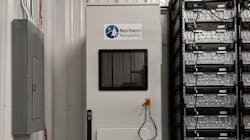California Naval Base to Install Battery Storage System for Microgrid Project
Northern Reliability, Inc. (NRI) of Waterbury, Vermont, was selected by the Palo Alto, California-based Electric Power Research Institute (EPRI) to design and build two transportable microgrid Battery Energy Storage Systems (BESS) for the U.S. Navy. The two systems will go through testing at the Port Hueneme Naval Base in Ventura County, California. They will then go through testing and operational use at a Naval Surface Warfare CenterPort Hueneme division data center in Southern California.
Microgrids are small electrical systems that can operate both independently and together with the larger local electrical grid. The microgrid in this project will use solar energy and the BESS, along with Navy site generation, to provide emergency backup electricity to critical Navy electrical loads. The ability of microgrids to enhance electric reliability and resilience in response to local grid power outages is currently the primary driver of their deployments, especially for U.S. military bases. Microgrids are being increasingly deployed at critical, nonmilitary facilities such as hospitals, fire stations, and airports to provide uninterrupted power during local electric utility outages.
NRI’s BESS systems will be delivered to Port Hueneme Naval Base in early 2020 for testing to better understand the real-world performance, capital costs, and maintenance costs of such battery subsystems when integrated into a ‘seamless’ backup electric power microgrid. After testing the microgrid with its BESS, the system will be moved and reconnected to support a Navy data center as part of the tests of the system’s transportability.
Data obtained on the costs, performance, and benefits of the overall microgrid project will help support future commercial deployments of microgrids for military and non-military applications.
“Microgrids installed for backup power on military and non-military sites are currently customized according to each site, which result in costly and, at times, lengthy design and installation time periods. There is a need to demonstrate a standardized microgrid configuration consisting of distributed energy resources (DER) easily adaptable to a wide variety of electrical and non-electrical siting requirements,” said Dr. Robert Schainker, one of EPRI’s Senior Technical Executives and a Principle Investigator for EPRI’s military sited microgrid projects. “Working with NRI and its containerized BESS gives us the opportunity install, operate, and evaluate a standardized microgrid that aims to provide reliability and resiliency while reducing GHG emissions.”
Each NRI BESS is designed to be rapidly deployable (for military and non-military use). Both are 250 kW, 4-hour lithium-ion based systems contained in transportable shipping containers. Additionally, both are fitted with Navy-approved supplemental fire protection components and incorporate an innovative lithium-ion battery cell off-gas detection device, which is integrated with the fire protection/suppression system.
“Unlike fixed-site energy storage, transportable energy storage systems afford both utilities and developers a wide range of possible applications and brings to the table a whole variety of options for electric blackout recovery, disaster recovery, and weather/fire storm response,” said Jay Bellows, NRI’s President & CEO. “For our military, mobile microgrids with energy storage offer a readily available, quiet power and energy reserve for military decision makers to use during day-to-day operations. This solution provides customers with reliable power, keeps our troops safer, enables operational flexibility, and provides the effective integration of modern-day renewable resources with legacy assets like backup diesel generators, wherever needed.”
EPRI’s $2 million contract with NRI was finalized in August 2019. The project is funded in part through the California Energy Commission’s Electric Program Investment Charge (EPIC) program, and the Department of Defense’s Environmental Security Technology Certification Program project (DoD-ESTCP) project.
